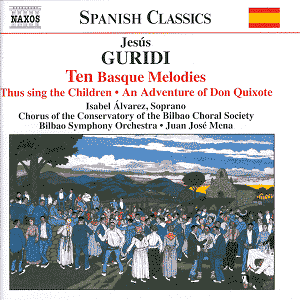|
Guridi's concert music has been granted a fresh
lease of life since the first Basque series Claves disc was issued
in 1997 at full price. There he proved himself as a regionalist
practised in the spiced and barbed folk idiom of the Basque country.
He also of course took up more universal themes as in the Walt Disney
fantasy. Predominantly however Guridi was a music poet of this wildly
independent North Iberian region.
The Diez Melodias Vascas span many moods
and moments from a folksiness part-Grainger, part-Canteloube (Narrativa)
to the murmur of a sad dream (Amorosa) to the pavane of Religiosa
with its well captured surge of sound and Russian or Armenian quality
to the antique Handelian Danza. Then comes the Gum-Suckers
March of De Ronda and the evocation of misty views across
the mountains in Elegiaca. Beautifully done by the Bilbao
orchestra though audio-technically not on a par with the clarity
of the premium price Claves recording.
So The Boys Sing is marked out by its reedy
and guttural lack of sophistication, its innocence and sweetness
although this is offset by some grandly thunderous statements by
full orchestra (3.46). The children mourn the loss of one of their
friends and the passing of ‘the little white coffin’. This work
has much the same beguilingly unsophisticated sense as Prokofiev's
Winter Bonfires suite
The Don Quixote piece was the only orchestral
work he produced while at work on his grand opera Amaya (superbly
recorded on Marco Polo and reviewed on this site). Here there is
magnificent brass playing and a sheer brilliance learnt from the
Rimskian method.
In a Phoenician Vessel starts with a macho
brass fanfare. The music tells the tale of Telemachus the son of
Odysseus. The sea plays a central role as it does in the life of
the Basque people both as sustainer and as threat. A sometimes hesitant
romantic atmosphere is very well sustained.
The Early Cock Is Crowing is a rapturously
lovely piece with a sighing 'tail' sequence rather like the sighing
in the sails of the Phoenicians’ vessel. The work ends in a glistening
quiet conjured by the violins.
The only thing I lament about this reasonably well
filled and finely executed disc is the continuing absence of Guridi's
Sinfonia Pirenaica. Which company will be first to offer
this intriguing work? Surely a boina of honour awaits the company
that achieves the world premiere recording of that work.
Guridi enthusiasts, even those with the Claves CD or with the now
deleted ‘Musiques Basques’ (7243 5 56876 2 3) or vintage Arambarri-conducted
EMI Classics CDs will need this disc because the choral works are
not otherwise available.
Rob Barnett
see also review
by Paul Shoemaker
|
